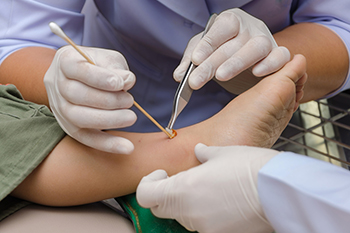Treatment Options for Foot Ulcers
Tuesday, 05 March 2024 00:00
Foot ulcers are commonly associated with conditions like diabetes. They appear as red craters in the skin, often surrounded by callused borders that potentially expose tendons or bones. Pain may not always be present, particularly in cases of diabetic neuropathy. Diagnosis involves a thorough examination by a podiatrist, who can assess ulcer depth and recognize signs of infection. Wound care for diabetic foot ulcers typically includes debridement, a process designed to remove any diseased tissue. This is followed by applying a dressing and prescribing specialized footwear to relieve pressure. Regular monitoring and dressing changes are essential, and antibiotics may be prescribed if infection is present. Prompt attention and comprehensive wound care are essential to prevent complications, such as infection or gangrene. For advice and guidance with wound care related to diabetic foot ulcers, it is suggested that you schedule an appointment with a podiatrist.
Wound care is an important part in dealing with diabetes. If you have diabetes and a foot wound or would like more information about wound care for diabetics, consult with one of our podiatrists from Bazzi Podiatry. Our doctors will assess your condition and provide you with quality foot and ankle treatment.
What Is Wound Care?
Wound care is the practice of taking proper care of a wound. This can range from the smallest to the largest of wounds. While everyone can benefit from proper wound care, it is much more important for diabetics. Diabetics often suffer from poor blood circulation which causes wounds to heal much slower than they would in a non-diabetic.
What Is the Importance of Wound Care?
While it may not seem apparent with small ulcers on the foot, for diabetics, any size ulcer can become infected. Diabetics often also suffer from neuropathy, or nerve loss. This means they might not even feel when they have an ulcer on their foot. If the wound becomes severely infected, amputation may be necessary. Therefore, it is of the upmost importance to properly care for any and all foot wounds.
How to Care for Wounds
The best way to care for foot wounds is to prevent them. For diabetics, this means daily inspections of the feet for any signs of abnormalities or ulcers. It is also recommended to see a podiatrist several times a year for a foot inspection. If you do have an ulcer, run the wound under water to clear dirt from the wound; then apply antibiotic ointment to the wound and cover with a bandage. Bandages should be changed daily and keeping pressure off the wound is smart. It is advised to see a podiatrist, who can keep an eye on it.
If you have any questions, please feel free to contact one of our offices located in Detroit, West Detroit, Northwest Detroit, Sterling Heights, Hamtramck, Dearborn Heights, Madison Heights, Redford, and Livonia, MI . We offer the newest diagnostic and treatment technologies for all your foot care needs.




